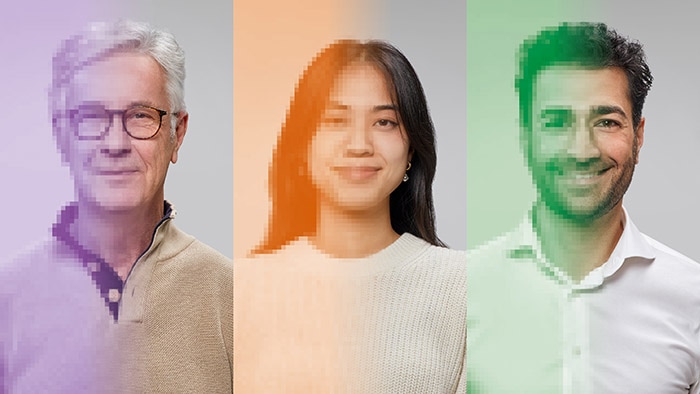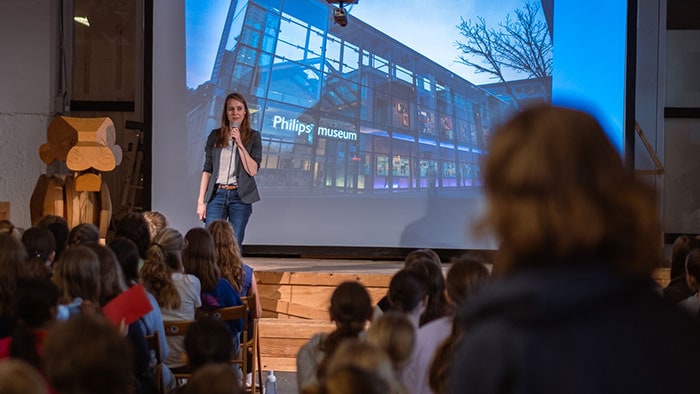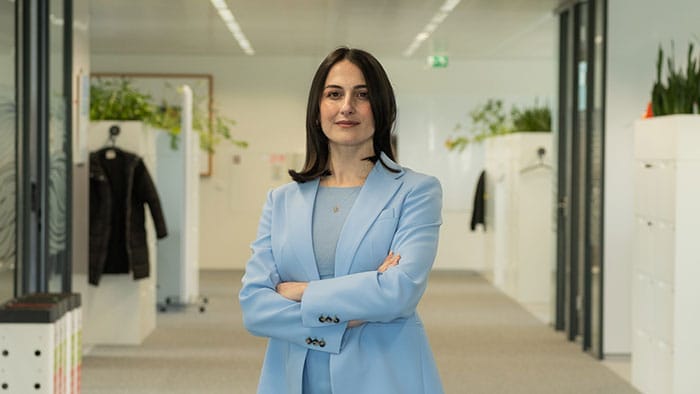Er zijn meer perspectieven en collectief denken nodig in de data science om algoritmes breder en beter te trainen. Alleen dan kan kunstmatige intelligentie (AI) verantwoord en onbevooroordeeld worden ontwikkeld en worden gebruikt in de gezondheidszorg. Dat was een belangrijke boodschap van Tina Manoharan, Global Leader of Data/AI & Digital Innovation bij Philips, tijdens het Women in Data Science event op 27 maart in Eindhoven. “De AI is slechts zo goed als de data waarmee je het traint. Je hebt collectief denken vanuit verschillende disciplines en perspectieven nodig om vooroordelen te vermijden.”
Manoharan sprak voor een volle zaal over de snelheid waarmee kunstmatige intelligentie op verschillende terreinen doorbreekt. Inderdaad, kunstmatige intelligentie is meer dan alleen een technologie; het zal ons leven beïnvloeden op manieren die we ons nu nog niet kunnen voorstellen. In ons privéleven en op het werk. Volgens haar zal AI de huidige gezondheidswerkers niet vervangen, maar hen helpen hun werk nog beter te doen. “AI vervangt de experts niet, maar AI vergroot de menselijke ervaring, zodat zij de meest optimale beslissingen voor hun patiënten kunnen nemen.”
Transformatie van de zorgverlening
Volgens Manoharan speelt kunstmatige intelligentie een steeds grotere rol in de gezondheidszorg. In haar presentatie liet ze enkele realistische voorbeelden zien van hoe AI kan worden toegepast op de workflows van clinici. “AI heeft de potentie om de manier waarop we zorg verlenen te transformeren. Het kan ons helpen complexe ziektepatronen te begrijpen en preciezere diagnoses te stellen. Daarnaast kan het ons helpen de gezondheid van mensen te monitoren en preventieve maatregelen te nemen om ziekten te voorkomen”, aldus Manoharan.
Geïndividualiseerde behandeling
Een voorbeeld van hoe AI kan worden gebruikt in de gezondheidszorg zijn ziekte-specifieke behandeladviezen. Manoharan: “Stel dat er kanker wordt gevonden bij een patiënt. Deze technologie helpt artsen de meest effectieve behandelingen voor individuele kankerpatiënten te identificeren en voor te stellen. Bijvoorbeeld door enorme hoeveelheden medische literatuur te analyseren en te vertalen naar klinische aanbevelingen voor artsen. Zo kunnen artsen snel de juiste behandelingstrajecten voor hun patiënten vaststellen en betere beslissingen nemen op basis van de meest recente en betrouwbare informatie.”
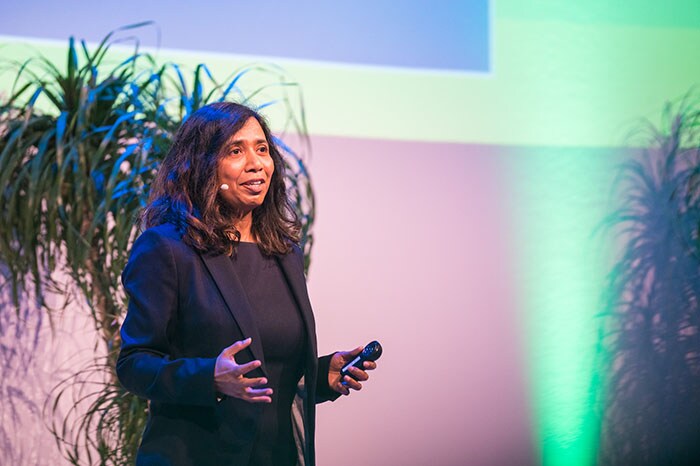
Een completer beeld
Een ander voorbeeld van hoe AI kan worden gebruikt in de gezondheidszorg is AI-enabled beeldinterpretatie. Beeldvormende technieken zoals MRI-scans worden steeds belangrijker bij het stellen van diagnoses, omdat er meer druk is op radiologie-afdelingen door de groeiende en vergrijzende bevolking en de opkomst van chronische ziekten. “Met AI kunnen we deze beelden sneller en beter analyseren, zodat we sneller de juiste diagnose kunnen stellen en de juiste behandeling kunnen starten. Bovendien stelt AI ons in staat om meer longitudinale multi-model patiëntgegevens te combineren om een completer beeld te krijgen van de situatie van de patiënt”, legt Manoharan uit.
Continue feedback
De mogelijkheden zijn eindeloos, mits het algoritme goed is gemaakt en getraind. En de training stopt niet wanneer het algoritme wordt ingezet in de klinische workflow. Er zullen altijd situaties zijn waarvoor de AI vooraf niet is getraind. In haar presentatie ‘Human AI: a symbiotic relationship ort he real world’ liet Manoharan zien wat zij definieert als een symbiotische relatie tussen mens en AI. “Het mooie van deze symbiotische relatie is dat ze elkaar versterken. Dat geldt voor beide kanten.”
Elkaar versterken
De menselijke expertise wordt vergroot en verbeterd met behulp van AI, maar de AI wordt op zijn beurt beter door training met goede middelen en voortdurende feedback van gebruikers in de echte wereld die er dagelijks mee werken. “We creëren AI in laboratoria, maar data scientists doen veel meer dan alleen gegevens verwerken.”
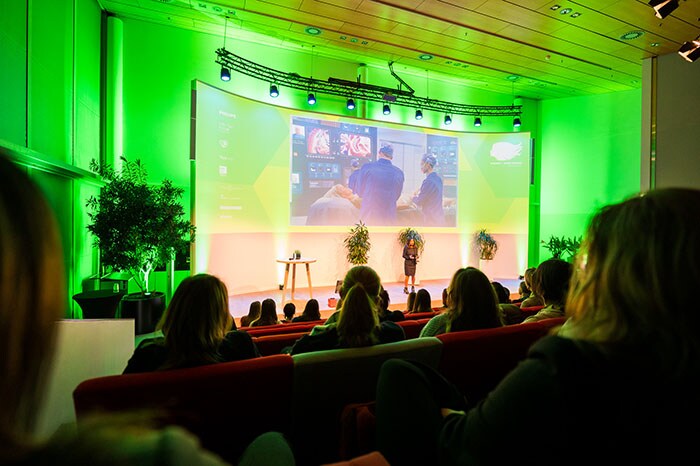
Creatief beroep
De AI moet van waarde zijn voor gebruikers en hun patiënten. Dat zorgt ervoor dat je als datawetenschapper echt moet weten wat er speelt in de dagelijkse klinische routines van zorgprofessionals en hun werk, de behoeften van patiënten en de mogelijkheden en beperkingen van de technologie. Manoharan: “Het is een heel creatief beroep, want je moet altijd buiten de kaders denken om de juiste klinische en gebruikersbehoefte op de meest geschikte manier aan te pakken.”
Ethisch en verantwoordelijk
De voordelen van het toepassen van kunstmatige intelligentie kunnen alleen worden bereikt als de onderliggende algoritmen ethisch en verantwoord worden gemaakt. Dit vereist diversiteit en inclusie, stelde Manoharan. Dat betekent dat een goede balans tussen mannen en vrouwen cruciaal is, maar daar houdt het niet op. Het is ook belangrijk dat een multidisciplinair team met een mix van gezichtspunten en persoonlijke ervaringen samenwerkt, en dat de datasets verschillende perspectieven en achtergronden vertegenwoordigen.
Manoharan: "Het is erg belangrijk om te blijven werken aan een diverse en inclusieve ontwikkeling van AI om het volledige potentieel van deze technologie te benutten en ervoor te zorgen dat iedereen profiteert van de voordelen die het kan bieden."
Levens verbeteren
“De missie van Philips is om levens te verbeteren door innovatie en gezondheidszorg voor iedereen toegankelijk te maken”, besloot Manoharan. "Met de opkomst van deze nieuwe en opwindende technologie worden diversiteit en inclusie steeds belangrijker. Het is van fundamenteel belang dat we betere algoritmen creëren die toepasbaar zijn op meer mensen om de menselijke ervaring te ondersteunen. Met die slimme algoritmen kunnen we nog meer mensen helpen beter en gezonder te leven en kunnen gezondheidswerkers doen wat ze het beste kunnen: patiënten helpen in het voorkomen, diagnosticeren, behandelen en monitoren van ziektes."
Ze eindigde haar presentatie met een oproep aan vrouwen: "Jullie vrouw kunnen hier een groot verschil maken, en daarom zie ik graag dat meer Women in Data Science data omzetten in bruikbare inzichten!"
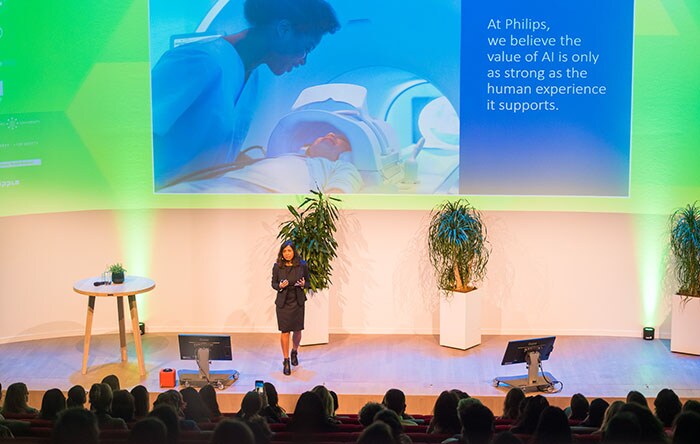
'Artificial intelligence has the potential to enhance the human experience and empower caregivers to do their best’
More perspectives and collective thinking are needed in data science to train algorithms more broadly and better. Only then can artificial intelligence (AI) be responsibly developed and used in healthcare without bias. That was a key message from Tina Manoharan, Global Leader of Data/AI & Digital Innovation at Philips, at the Women in Data Science event on March 27 in Eindhoven, Netherlands. "The AI is only as good as the data you train it with. You need collective thinking from different disciplines and perspectives to avoid biases."
Manoharan spoke to a packed room about the speed at which artificial intelligence is breaking through in different fields. Indeed, artificial intelligence is more than just a technology; it will affect our lives in ways we do not envision today. In our private lives and at work. According to her, AI will not replace today's healthcare professionals but help them do their jobs even better. “AI does not replace the experts, but AI augments the human experience to enable them to make the most optimal decisions for their patients.”
Transformation of healthcare delivery
According to Manoharan, artificial intelligence is playing an increasing role in healthcare. In her presentation, she showed some realistic examples of how AI can be applied to clinicians' workflows. “AI has the potential to transform the way we deliver care. It can help us understand complex disease patterns and make more precise diagnoses. In addition, it can help us monitor people's health and take preventive measures to prevent disease,” Manoharan said.

Individualized treatment
An example of how AI can be used in health care is disease-specific treatment recommendations. Manoharan: "Suppose cancer is found in a patient. This technology helps doctors identify and suggest the most effective treatments for individual cancer patients. For instance, analyzing vast amounts of medical literature and translating it into clinical recommendations for physicians. It enables physicians to quickly identify the right treatment paths for their patients and make better decisions based on the latest and most reliable information."
A more complete image
Another example of how AI can be used in healthcare is AI-enabled image interpretation. "Imaging techniques such as MRI scans are becoming increasingly important in making diagnoses, because there is more pressure on radiology departments with growing and ageing populations and the rise of chronic diseases. With AI, we can analyze these images faster and better, so we can make the correct diagnosis faster and start the right treatment. In addition, AI allows us to combine more longitudinal multi-model patient data to get a more complete picture of the patient's situation," Manoharan explained.
Continuous feedback
The possibilities are endless, provided the algorithm is properly created and trained. And training does not stop when the algorithm is deployed in the clinical workflow. There will always be situations that the AI has not been trained for beforehand. In her presentation, ‘Human AI: a symbiotic relationship for the real world’, Manoharan showed what she defines as a symbiotic relationship between humans and AI. "The beauty of this symbiotic relationship is that they reinforce each other. That goes for both sides."

Strengthening each other
Human expertise is augmented and enhanced with the help of AI, but the AI in turn gets better through training with good resources and continuous feedback from users in the real world who work with it daily. "We create AI in labs, but data scientists do much more than just process data. The AI must be of value to users and their patients. That ensures that, as a data scientist, you really have to know what's going on in the daily clinical routines of healthcare professionals and their work, the needs of patients and the possibilities and limitations of the technology. It’s a very creative profession, because you always need to think outside the box to address the right clinical and user need in the most appropriate way."
Ethical and responsible
The benefits of applying artificial intelligence can only be achieved if the underlying algorithms are made ethical and responsible. This requires diversity and inclusion, Manoharan stated. That means it is crucial to have a good balance of men and women, but it does not stop there. It is also important that a multidisciplinary team with a mix of viewpoints and personal experiences works together, and the datasets represent different perspectives and backgrounds. "It is very important to continue to work toward a diverse and inclusive development of AI in order to harness the full potential of this technology and ensure that everyone benefits from the advantages it can provide."
Improving lives
"Philips' mission is to improve lives by making innovation and healthcare accessible to everyone," Manoharan concluded. "With the uprise of this new and exciting technology, diversity and inclusion are becoming increasingly important. It’s fundamental that we create better algorithms that are applicable to more people to support the human experience. With those smart algorithms, we can help even more people live better, healthier lives, and health professionals can do what they do best: help prevent, diagnose, treat and monitor patients."
She ended her presentation with an appeal to women: “You woman can make a big difference here, and so I would love to see more Women in Data Science turning data into actionable insights!”
Deel op social media
Onderwerpen
Contact

Tommie Dijstelbloem
Woordvoerder Philips Benelux Tel: +31 6 19 28 83 20
You are about to visit a Philips global content page
Continue









